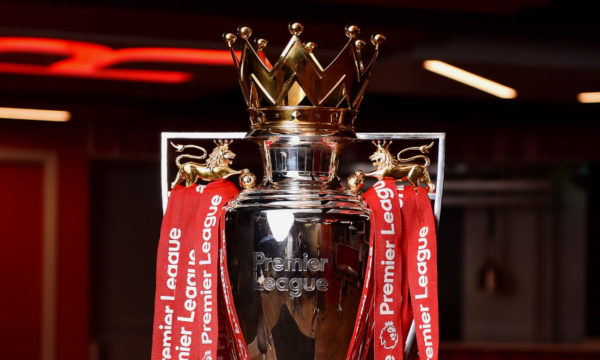It was football’s version of The Clash of the Titans. Or so it seemed at the time. Six of the world’s best football managers all set to do battle for the Premier League title in the summer of 2016. The Premier League had never before seen such a concentration of prime managerial talent – all at the so called “Top Six”.
The arrival that summer of Pep Guardiola at Manchester City, Jose Mourinho at Manchester United and Antonio Conte at Chelsea perfectly rounded off a cast that already included Arsene Wenger (Arsenal), Jurgen Klopp (Liverpool) and Mauricio Pochettino (Tottenham). All but one of the six had won multiple league titles across Europe’s top five leagues.
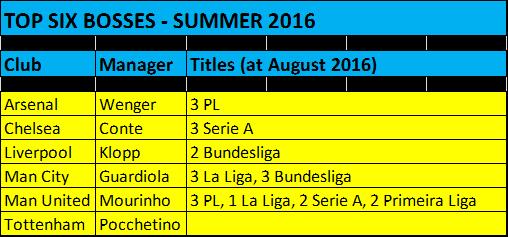
Each of those clubs would have expected a title challenge – or at least a top four finish – under such accomplished names. Yet, only one team can be champion, and six in four won’t go. At that moment in time four years ago, it seemed we were on the brink of a fight for the ages. There were bound to be winners and losers.
Here’s a look back at how things have panned out for each club in the Premier League since that summer. I have adopted a points system as follows: 10 points for a first place finish, 8 points for second place, 6 points for third and 4 points for fourth; 2 points for fifth and 1 point for sixth. No points are awarded for positions lower than sixth.

The Gunners had pipped Tottenham at the tape to finish 2nd in 2015/16 – the best of the “Top Six” as Leicester took the title – but the 2016/17 season would prove the beginning of the end of Wenger’s long reign at the Emirates. Arsenal tumbled out of the top four for the first time in 20 years, finishing just one point adrift in fifth. They haven’t been back since. The North Londoners fared even worse in 2017/18, dropping to sixth.
The legendary Frenchman said his goodbyes and Spaniard Unai Emery took the reins – only to depart in ignominy barely 18 months later with the Gunners even further off the pace. Mikel Arteta’s nascent regime has the Gunner faithful hopeful again, but a 9th place finish last term only emphasizes how they’ve fared the worst of the “Six” since 2016.

The arrival of Mourinho – with his winning record everywhere – was supposed to return United to glory, but this proved a short lived liaison. The 2016/17 season brought success in the League Cup and Europa League but United – despite the best efforts of Zlatan Ibrahimovic and Paul Pogba – could only finish 6th in the Premier League.
They were much better the following season, finishing second on 81 points, an achievement somewhat tempered by the vast 19 point chasm that separated them from the champions. Still, it seemed a decent base to build on for 2018/19, but Mourinho was out by Christmas with United 12 points out of the Champions League spots.
Club legend Ole Gunnar Solksjaer was his surprise replacement, and he started quite well – earning a permanent contract – before falling away in the run in to finish 5th. It was the reverse for United in 2019/20 though, a poor start giving way to a strong finish, 3rd place and a return to the Champions League.
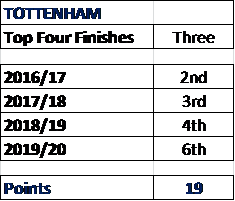
Having contrived to finish third in a two-horse race in 2015/16, the Spurs responded with their best season of the Premiership era. Pochettino’s team pushed champions Chelsea all the way racking up a club record 86 points to finish 2nd in 2016/17.
They’ve been on a downward slide since then, even if that wasn’t immediately apparent when they finished third in 2017/18. They did reach the Champions League final in 2018/19, but their league form had started to suffer by then and they barely hung on to fourth place. The wheels came off in 2019/20 though, Pochettino got the sack with Spurs well off the pace early in the season, and only a mini-revival under Mourinho took them to a 6th place finish.
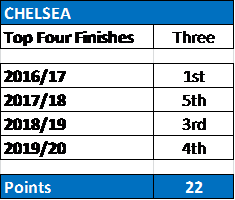
The Blues won the first battle of The Clash of the Titans. Antonio Conte took a few weeks to find his groove and then Chelsea took off, embarking on a 12 game winning streak and establishing a lead that proved ultimately insurmountable. Diego Costa’s goals often made the difference but a falling out with Conte proved damaging and he was gone in the summer, replaced by Alvaro Morata.
The next season proved Conte’s last as Chelsea slipped out of the top four and another Italian arrived in the shape of Maurizio Sarri from Napoli. A turbulent season ended with Chelsea back in the Champions League – and Sarri back on his way to Italy. Club legend Frank Lampard returned to take Chelsea through the next season, an up and down affair – transfer ban and all – but Chelsea just about hung on to finish 4th.

It’s been onwards and upwards for Liverpool since the summer of 2016. Jürgen Klopp’s first full season at Anfield and the Reds got off to a flying start – until they lost their way in winter. A strong run in was enough to secure 4th place though.
They started the next season a little less assuredly, losing heavily at both Manchester City and Tottenham in the early fixtures, but they bounced back – driven on by Mohammed Salah’s record breaking goal-scoring – and secured another top four finish. Defeat in the Champions League final seemed to spur them on the next season – has did the arrival of Brazil ‘keeper Alisson – and they would finish 2018/19 with an incredible 97 points and just one defeat.
That defeat was of course at Manchester City, who also beat them to the title by one point. Klopp’s team wouldn’t be denied for long though; 2019/20 brought home a first top flight title in 30 years, secured a record seven games to the end of the season, with Liverpool reaching 99 points and leaving Manchester City trailing 18 points behind in second place.
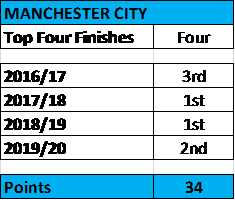
Four years on, it’s easy to conclude that Pep Guardiola is the clear winner of titanic managerial face-off. Of the six managers, he is one of only two still in the same job and Manchester City have claimed two Premier League titles (and numerous domestic cups) in that time.
Add to that a Premier League record 100 points in 2017/18 and a 98 point return the following season and the case makes itself. Yet, it didn’t start so swimmingly. Despite starting the season with six straight wins, City soon faltered and only rallied late on to finish in 3rd place. The next summer brought in another raft of transfers – full back Kyle Walker, midfielder Bernardo Silva and most tellingly, Ederson in goal for the struggling Daniel Bravo – and City romped to become centurions, 19 points clear of Manchester United in second place.
It was a different kind of race in 2018/19 though; Liverpool pushed City all the way to the last day of the season, but Guardiola’s team prevailed by one point. They couldn’t make it three titles in a row though; nine defeats meant they couldn’t keep up with Liverpool’s unrelenting pace in 2019/20, finishing a distant second.
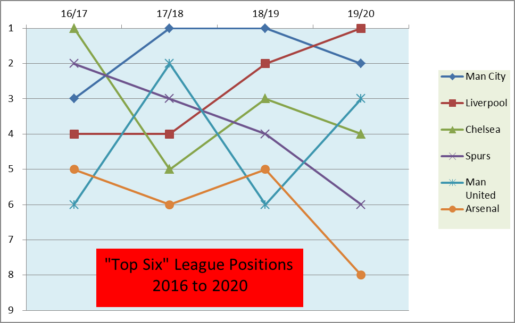
Four years on, the contrast couldn’t be any clearer. When the 2020/21 season kicks off next week, three of the “top six” will be led by relative novice managers – Lampard, Arteta and Solskjaer do not boast the cachet of Conte, Wenger or Mourinho – and some of the clubs have slipped too, with Tottenham and Arsenal finishing 6th and 8th respectively last season.
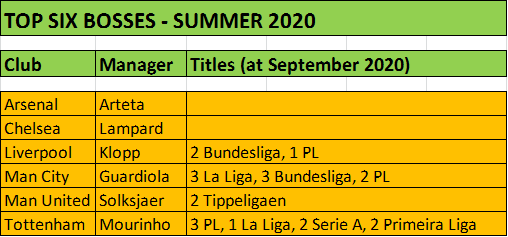
Even the notion of a “top six” is questionable now; Manchester City and Liverpool have dominated the last two title races – effectively establishing a “top two” – and the likes of Leicester City and Wolves have, over the last two seasons, staked credible claims for a place at the top table. Even Everton, with Carlo Ancelotti now at the helm and buoyed by heavy investment, will hope to have a say in proceedings this season. That said, more big spending at Arsenal, Manchester United and especially Chelsea should further strengthen the status quo and narrow the gap to that “top two”.
The talk will not be of superstar managers this year, but the clash at the top will be no less intense.










